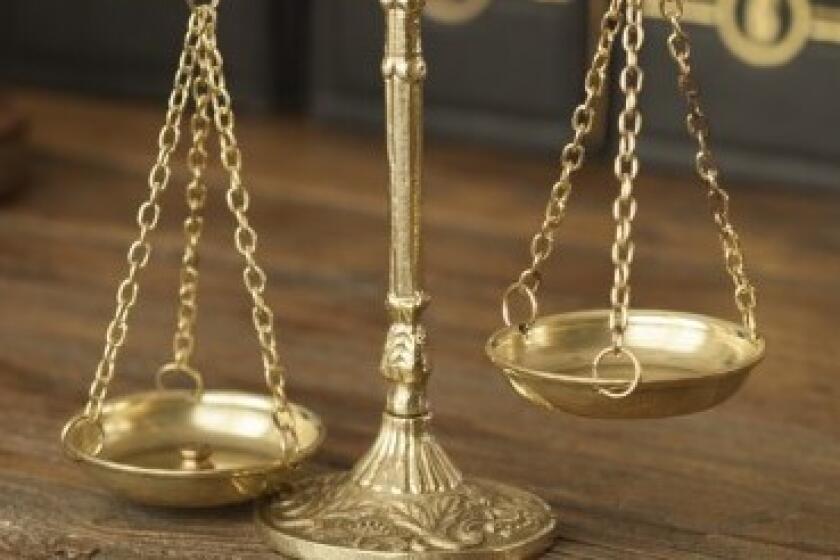SOUL FOOD:Analysts debate Potter’s religion
- Share via
The decision is in: J.K. Rowling’s Harry Potter story is, alas, a pagan tale, as many a Christian has charged since the publication of “Harry Potter and the Sorcerer’s Stone” nearly a decade ago. Thus saith Josh Moody.
His declaration was published July 24 in “Christianity Today,” days after the release of “Deathly Hallows,” the seventh and final volume in Rowling’s series of bestselling books. As much as anyone and more than most, Moody should know.
He’s the senior pastor of Trinity Baptist Church in New Haven, Conn., and associate fellow of Jonathan Edwards College at Yale. Josh Moody was born in Epsom, Surrey — suburban London, England.
Nevertheless, writing for the Wall Street Journal, children’s book reviewer Meghan Cox Gurdon posed another opinion. Based on evidence gleaned from “Deathly Hallows,” she argued that the Harry Potter saga is “subtly but unmistakably Christian.”
In light of its 759-page conclusion, Gurdon sees a reflection of the Christian symbolism found in J.R.R. Tolkien’s “Lord of the Rings” trilogy and C.S. Lewis’s “Chronicles of Narnia.”
Gurdon believes Rowling has in “Deathly Hallows,” finally, if “gently” laid it all out. “It,” that is, being the Christian worldview.
She points to a “great silver cross” (those are indeed Rowling’s words) that turns up to aid Harry midway through the book. The cross, readers soon discover with Harry, is “the sword of Gryffindor,” a deft, ancient tool against evil forces. There are the churchyard graves of Harry’s parents.
Rowling’s themes span “the preciousness of each human life; bodily resurrection after death; mercy, forgiveness and redemption; sacrificial love overcoming the powers of evil.” These are, Gurdon writes, “the [Christian] concepts that underpin the marvelously intricate world of Harry Potter.”
On the other hand, given the wizardly trappings of Harry’s world, this is a view that has often been rejected. Countless pastors and priests and bishops and outspoken evangelical icons have repeatedly warned their flocks of the dangers inherent in the Potter books.
Some have labeled them out-and-out evil. Yet the books have their defenders who argue that their magical trappings are benign.
After all, Tolkien’s “Lord of the Rings” and Lewis’s “Narnia” have their magic, too. Few advocates, though, have taken a vocal stand for an intrinsic Christian nature to Potter’s tale.
John Granger has been a rare exception. Granger is an Orthodox Christian trained in classical languages and literature at the University of Chicago.
He contends that Rowling’s literature, like that of Lewis and Tolkien, is part of the alchemical — and very Christian — tradition in English literature. Four years ago at the Nimbus symposium on Harry Potter, which convened in Orlando, Fla., and later in “Touchstone” magazine in an article titled “The Alchemist’s Tale: Harry Potter & the Alchemical Tradition in English Literature,” he made his case at length.
The magic in the Harry Potter books, he makes clear, is never invocational; it never “involves the calling in of demons or fallen powers, which is the magic of the subspiritual or psychic realm condemned and forbidden by scripture.” Instead, Granger says, Potter’s magic is incantational — the kind of magic used in literature “from Chaucer to Tolkien” as “a cipher for a human spiritual faculty we enjoy as images of God.”
Yet even with the explicit Christian references found in “Deathly Hallows,” not everyone is buying it. Among dissenters, Lev Grossman has to be the silliest.
In a mini-essay written for “Time” he says, “If you want to know who dies in Harry Potter, the answer is easy: God.” Harry Potter, he claims, “lives in a world that has been scrubbed clean of any religion or spirituality of any kind.”
While Rowling has said she’s a member of the Church of Scotland, in Grossman’s opinion “she has more in common with celebrity atheists Richard Dawkins and Christopher Hitchens than she does with Tolkien and Lewis.”
As he sees it, the world she has conjured up for Harry is one of “secular, bureaucratized, all too human sorcery, where psychology and technology have superseded the sacred.” Since Rowling made a sport of skewering bureaucracies in the Potter books, one can only wonder if these are the books Grossman has been reading.
When “AGAIN Magazine,” an Orthodox Christian periodical, re-published a 2005 interview with Granger, it received so many “strongly worded criticisms” from its readers that its editor, Douglas Cramer, published a response to “more fully articulate” the magazine’s editorial position: that the Potter books are “potential gateways” to conversations about the Christian faith.
Since penning the last three words of Harry Potter’s epic adventures, Rowling has hinted that she might one day write a Harry Potter encyclopedia. If she does, perhaps then we will learn — along with the middle names of Harry’s ancestors — his religion.
It’s a debate evidently harder to kill than Voldemort, Harry’s evil arch-nemesis. If only Hogwarts sorting hat could be applied to it.
All the latest on Orange County from Orange County.
Get our free TimesOC newsletter.
You may occasionally receive promotional content from the Daily Pilot.



